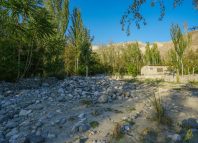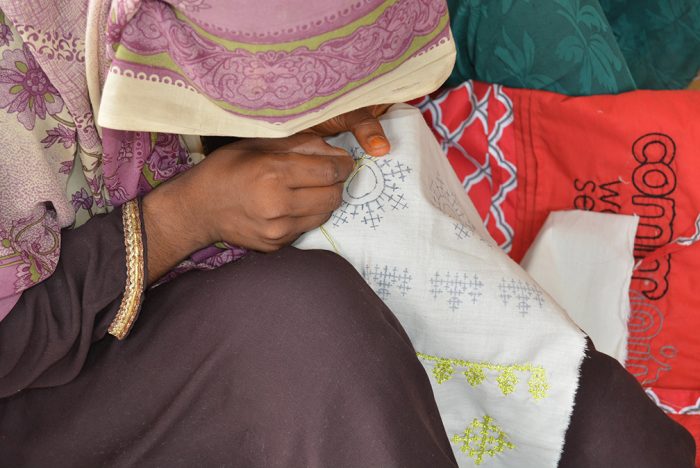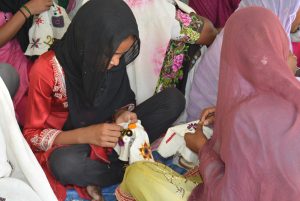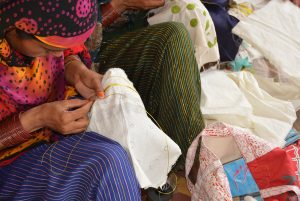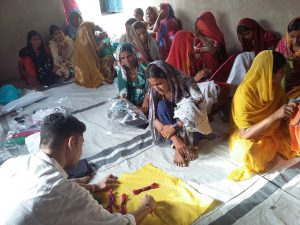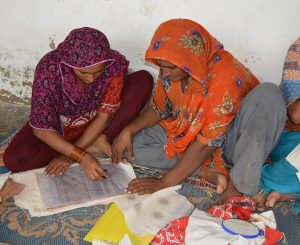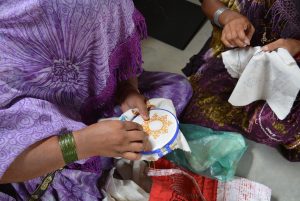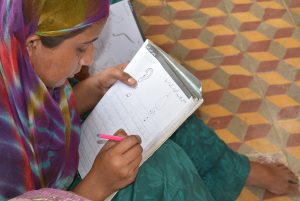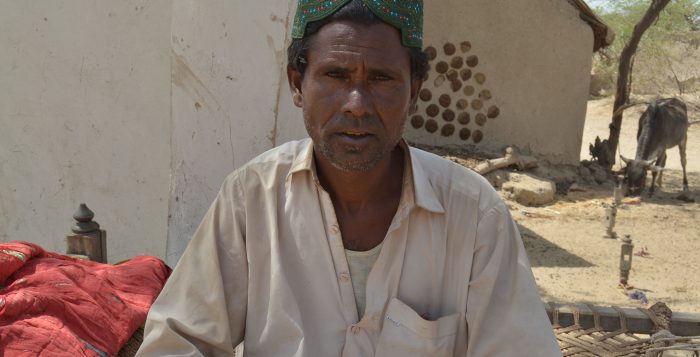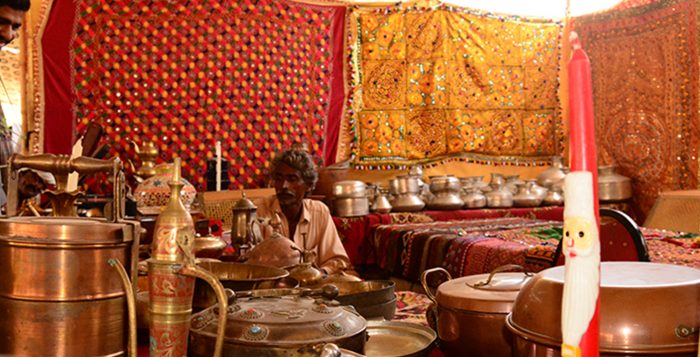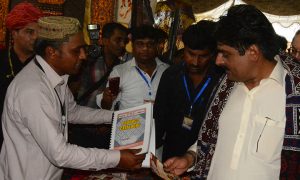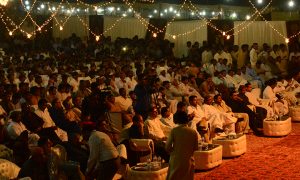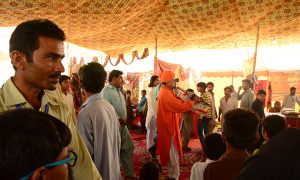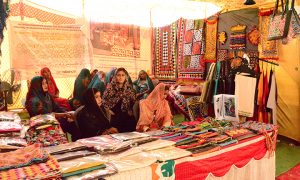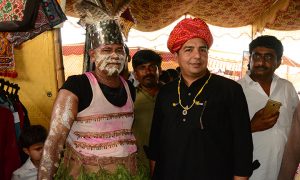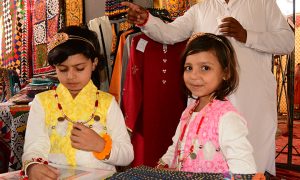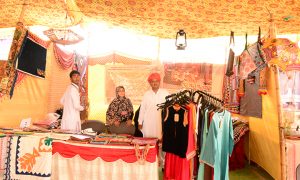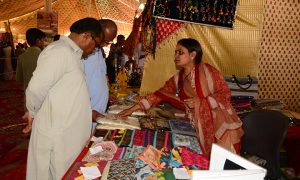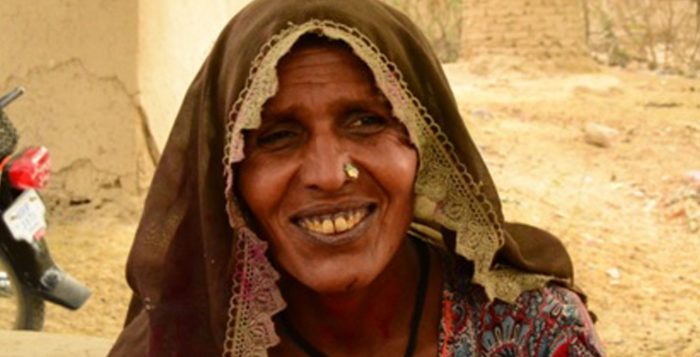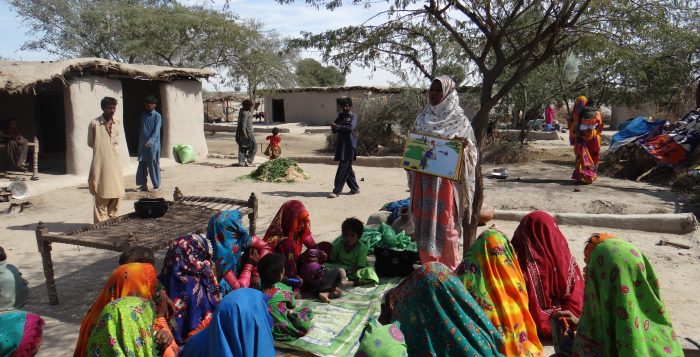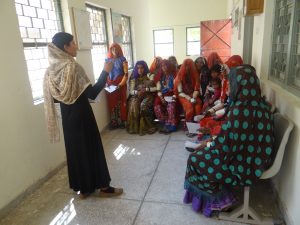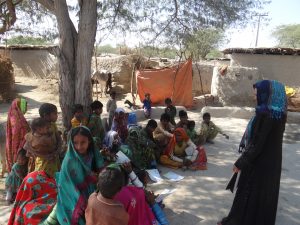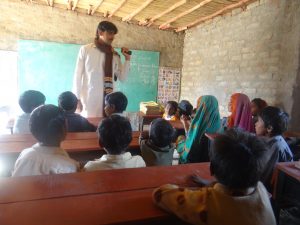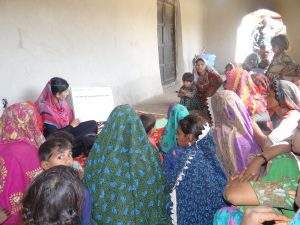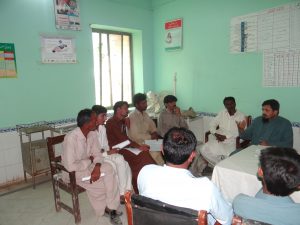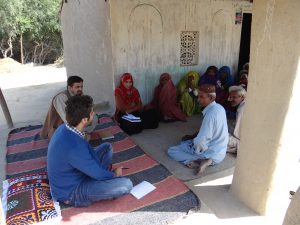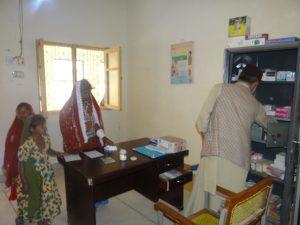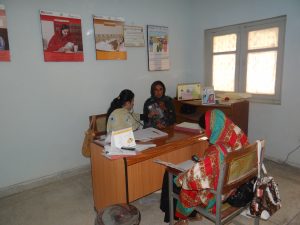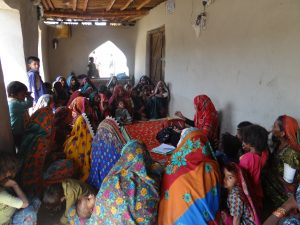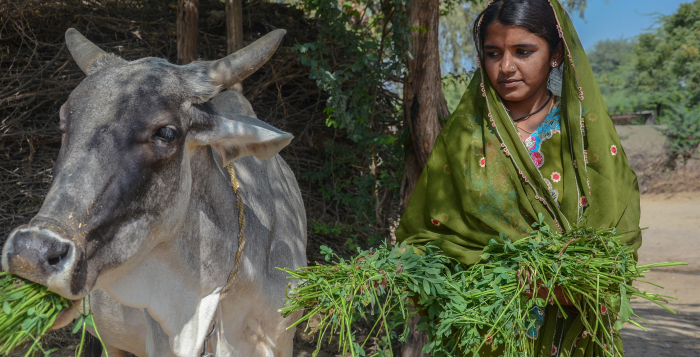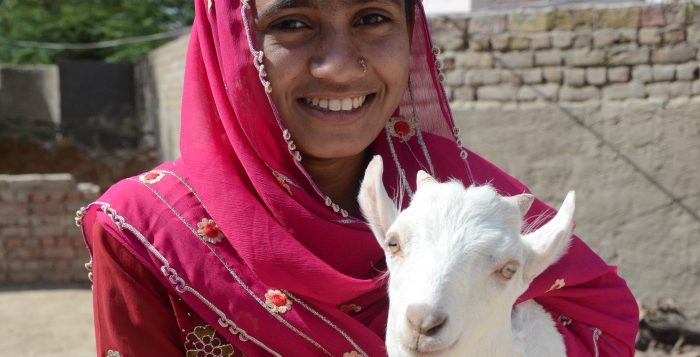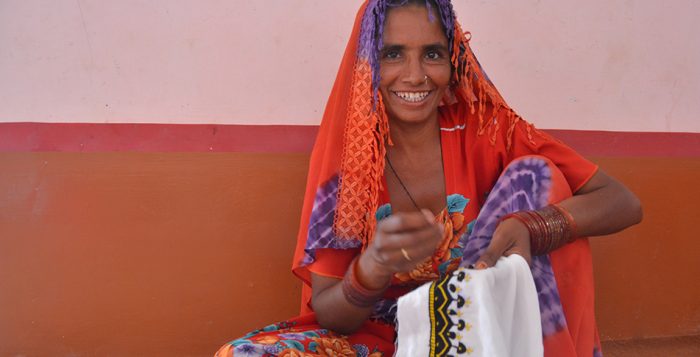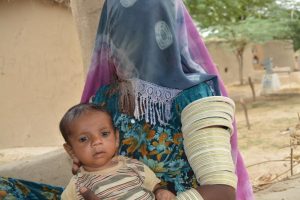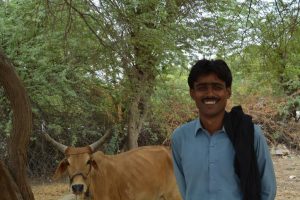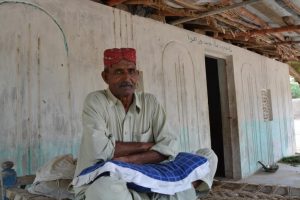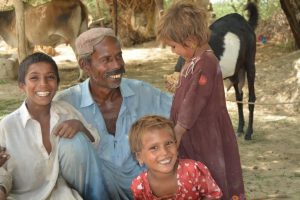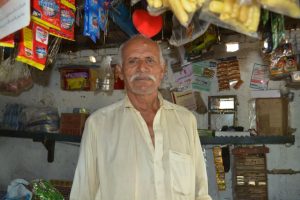| Duration | Jul 01, 2016 — Jun 30, 2017 | |
| Location | Thatta & Umerkot Districts, Sindh | |
| Key Activities |
| |
| Participants | 110 including teachers and students |
Archives
Three hundred new artisans enrolled for skill building in Umerkot
Community world Service Asia’s livelihoods and women empowerment project, supported by YCARE and UKAID, in Umerkot district has initiated its third year this April. The activities under the project aim to empower local women with a sustainable increase in their household income through enhancing their handicrafts skills and connecting them with markets, among the many other components of the project. This year, three hundred new artisans have been selected from nine new villages in Union Council Karroo Syed and Sabo this year.
A six months training was designed in two phases, each of three months, on Skill enhancement and Product Development with the expertise of designers from Indus Valley School of Arts and Architecture (IVS) Karachi.
The designer identified six main stitches for skill development, namely Kacho, Pako, Muko, Chain, Kharak and Hurmuch. During the first three months of the training, stitching and embroidery skills of local artisans’ part of the Women Enterprise Groups (WEGs)[1], were enhanced. The skill building mainly focused on building upon the traditional skills that these women already had but in more accordance to latest fashion trends and market demand, which were lacking in their previous home-made products. These skill enhancement classes were organized by Community liaison officers (CLOs) and mentored by Enterprise Development Officers (EDOs) of Community World Service Asia.
In addition, artisans were also taught the value addition of using the right color combinations, designing and cuts and quality control- all aspects which are pivotal to the urban buyers. For budgeting, pricing and dealing with customers, the artisans were given a three months training on adult Literacy courses which enabled them to read, write and compute during their business dealings.
The determined women from Umerkot are currently practicing their newly acquired skills by working on test products using modern designs and fashionable color schemes. This will particularly allow artisans to improve their quality of work and design which will increase the value and exclusivity of their handmade products.
[1] Women Enterprise Group is group formed of rural artisans, producing hand-made products, in the vocational centers established in various villages of Umerkot.
Mohan’s inspiring transformation
“My father drank alcohol daily and used to beat my mother,” quietly recounted a 15 years old daughter of Mohan from Haji Chanesar Mari village.
Mohan, father to five sons and two daughter, was a hopeless alcoholic, living with his family in the small but close-knit village of Haji Chanesar Mari in Umerkot. He was a selfish man who only thought of himself and never considered the impacts of his drunkenness on his wife and children. Many evenings, Mohan’s children witnessed their mother, Devi, being beaten by their drunk father. Some evenings, one of the children would become victims of his physical and verbal abuse as well.
As a small, independent farmer, Mohan earned well. Despite his sufficient earnings, Devi, was unable to save any money for the dowry of their daughters or for the purchase of cattle for the family’s nutritional support. All of Mohan’s extra earnings were consumed on alcohol. “He was consuming alcohol of at least PKR 200 regularly,” shared Devi. “At times, when he would be out of money, he would lend money from others to fulfill his alcohol craving.”
“Despite having such a beautiful family, I have mostly thought of myself only throughout my adult life,” shared Mohan himself one day. “I never dream about a better life, education, health or of other facilities for my children.”
Sajan, a gender activist in their village, took a lead to work with families affected by severe alcoholism. He had selected at least five households with whom to start work with. People advised him to consider working on other social issues, realizing the challenges he may face working with alcohol addicts. However, Sajan remained firm in his disposition as he considered alcoholism as one of the root causes of many gender based discriminatory practices and mind sets in their community. “Local alcohol is produced and is easily available from nearby villages,” Sajan pointed the severity of this issue.
Sajan and his colleague decided to train local children to play the role of drug addicts and their family members and demonstrate how one alcoholic would easily ruin a whole family. This drama was performed in Mohan’s house in his very presence. Mohan’s own son performed the role of an alcoholic who drank daily and beat his wife. At the end of the interactive play, a communal issue (alcoholism) was laid in front of the acting village leader in the play to find a resolution, seeking support from other men of the community as well. The alcoholic, played by Mohan’s son, was not even considered in the village decision making as the community saw him as a senseless man who was incapable of supporting himself or his family. “It was a very shameful moment for me that the character played by my son was hated by everyone and was failing everywhere in the community,” Mohan said disappointedly, “I realized that that could become the future of my children if I continue to drink this way.”
The story and performances touched Mohan’s slumbering soul and made him realize the impact of his disgraceful attitude on his family. He promised to quit drinking alcohol. Mohan kept his promise and quit soon after he saw the theater performance. Relinquishing a severe addiction as such as suddenly left Mohan unwell and ill. At this time, Sajan supported Mohan in acquiring medical support in Umerkot city where the doctor strictly advised him not to consume alcohol at all during this time. If he followed his advice, Mohan’s health would be better soon.
It has been month and half since Mohan has consumed a single drop of alcohol. Mohan and his family are very grateful to Sajan for not only helping Mohan leave his addiction but also in re-strengthening the family’s long lost bond. “I have stopped hanging out with friends who drank with me. I wish to become a proud father for my children and a responsible husband to my wife.”
Small efforts can sometimes bring a big change. We should never gauge or underestimate any effort that is made with complete sincerity and dedication; the results may not be seen at once but gradually it may change lives positively.
The Colors of Thar
The Sindh Culture and Tourism Department organized a two-day “Thar and Parker Festival” at the historical Umerkot Fort from the 24th – 25th of March. The various arts and crafts of the culturally rich Thar were put on display on a number of stalls at the vibrant festival. Apparel, rillies, handbags, fancy clutches, jewelry and other handmade crafts were on display and for sale. The entertaining event featured cultural activities such as camel and horse races, folk musical concerts and standing stalls of delicious local food.
The festival was inaugurated by Syed Sardar Ali Shah, Minister of Culture and Tourism in Sindh. “This festival will show the more beautiful facets of our rich desert which has formerly remained hidden as the region has predominantly been known for its natural disasters and subsequent deaths of children,” announced Mr. Shah. He added that such events will bring back harmony and a cultural spirit to the region which has suffered consistently in the past. Dost Mohammad Rahimoon, MPA Sindh, also present at the inauguration ceremony added, “The festival will provide a forum to people to showcase their rich culture and traditions for the entire world to see.”
Local artisans of Umerkot, along with Community World Service Asia staff, participated at the event, showcasing and promoting their handicrafts from Umerkot and Thatta. A range of products including casual apparel, jewelry and other home accessories produced under the brand “Taanka” were exhibited for sale at the festival. A large number of people visited the stall and watched the artisans hand make some of the products “live”. Syed Sardar Shah, also paid visited the Taanka stall and appreciated the quality work of the artisans that stood out among the many stalls at the festival.
Women from near and far villages, attended the event and were very happy to see a large variety of cultural apparels and antiques at the stalls. Families enjoyed tableau and the many music and theatre shows being performed by local communities and theater groups. Folk musician sang and entertained audiences at the festival for hours and received much applause and cheers. The festival ended with sparkling, large fireworks on the second day, lightening the lives of the people of Thar with color, happiness and celebration.
Hurmi: championing for change to achieve gender justice
said Hurmi, a resident of Haji Chanesar village in Umerkot. Hurmi is the Vice President of the Steering Committee of the village and a gender activist in the area.“Daughters have always been preferred in our family, unlike other families in the village. My husband and I have never given priority to our two sons over our two daughters. We love all of them equally,”
“My first child was a daughter. Normally in our community, daughters are considered as burdens and families are not so happy when a girl is born. But the case was different at our home. I am lucky to have a husband who loves daughters more.”
When the skills development center was set up at Haji Chanesar Village, Hurmi helped identify artisans who were most in need of a sustainable livelihood. Later in the project stage, a steering committee was formed for which Hurmi was nominated as Vice President by the unanimous vote of the artisans themselves.
“After the Community Management Skill Training, the Steering Committee was well equipped with knowledge on how to manage communities and resolve their issues and conflicts. As the Vice President, my role was more influential as many expected me to bring change in the rigid traditions we have been following for years.”
“The center brought countless benefits to women and girls in residual and nearby villages. They used to work in the fields in the season of cotton picking. Parents of young girls felt insecure sending their daughters to the fields, as they worked under the scorching sun and the bushes and thorns would tear their clothes or injure them. The center serves as a shadow in their lives. We encouraged the men of our families to send their wives, sisters and daughters to the center without a worry as the environment is safe and secure. Women in our area now work without worrying about traveling long distances while carrying heavy crops on their heads.”
As a dedicated member of the Steering Committee, Hurmi worked actively for the well-being of her fellow villagers. Recognizing her consistent efforts and dedication, Hurmi was selected as a participant of a ToT for Gender Activists.
reiterated Hurmi with a confident smile.“When I joined the Gender Group as an activist, my in-laws and neighbors discouraged me saying such activities for women were not part of our culture and it was not right to let women and girls talk so boldly on sensitive issues. My husband on the other hand, supported me strongly. He motivated me to work as a gender activist and change the mind-sets of the people who did not allow their daughters to grow socially and economically,”
narrated Hurmi disappointedly,“When I started working as a gender activist, I realized that the people in these rural communities are still living in a backward world, where caste difference was a firm way of life. One of the reasons for some families to not send their daughters to the skills center was the issue of caste difference. They could not allow their daughters to sit with women belonging to a lower caste than them. They also believed that sending their daughters to the skill building center will bring dishonor to their traditions and cultural values,”
“We conducted gender awareness sessions. We also led sessions to individual households to have a direct impact. Girls in our village started to go to school and early childhood marriages started to decrease.”
“Recently, a 16-year-old girl was getting married in our village. Our gender activist group visited the household and briefed the family about the problems young girls face in early marriages. When the girl’s in-laws (to be) came to schedule the wedding for February 23rd, the father of the 16-year-old refused instantly. The in-laws were furious to see his reaction. The daughter’s family called us to talk to the in-laws and explain the disadvantages of early childhood marriages to them as well. When the in-laws were also enlightened on the subject, they too understood and postponed the marriage to three years later. It is not just about one change in one house. People have started to think over many rigid traditions followed by us for ages as a result of these awareness sessions.”
“There was another instance of a man named Mohan. His wife, Dhai, was very disturbed as Mohan use to drink a lot. He used to waste his earnings on buying alcohol. He did not even spare Dhai’s minimum wage which she earned through stitching and agricultural work. He even hit Dhai when he was drunk. He once hit her with a small axe while he was drunk. He also used to beat his children. We tried to talk to him but he did not listen. So, we went to a doctor to talk about Mohan’s condition. We requested the doctor to scare Mohan by lying to him, stating that his health is weakening. When Mohan fell ill, the doctor came to Mohan and stated that he has cancer. Mohan got so scarred that he stopped consuming alcohol himself. Mohan has not been drinking since three months now. His wife is very relieved as he does not hit her or her children as his mental state has now improved. He does not waste money on drinking now and is more calm and caring towards his family. Yesterday, our steering committee held a meeting with the villagers. At the meeting, Mohan informed us that he has quit smoking as well. His wife is very happy now. Everybody in the village is curious to know how Mohan has changed so much.”
It is important for women to participate proactively for work on gender equality as only women can understand the problems of other women well enough. They will work towards resolving issues in a more realistic and practical manner.
“Women easily communicate their issues to us. I am happy when I help others to live a better life, especially when daughters are treated well. Now that we have been given a chance to live a better life, we must walk forward together to build a progressive society instead of letting each other down. I wish to see an all girls’ educated and equality based society”
Providing the basic human right to health care
According to the Pakistan Demographic and Health Survey (PDHS), 2012-13, maternal and child death remains a major concern in Pakistan. In the provincial public sector, health services are provided through a tiered referral system of health care facilities; with increasing levels of complexity and coverage from primary, to secondary and tertiary health services. Primary care facilities include Basic Health Units (BHUs), Rural Health Centres (RHCs), Government Rural Dispensaries (GRDs), Mother and Child Health (MCH) Centres and TB centres. Most of these public health facilities lack the provision of a broader range of preventive and curative health services.
Community World Service Asia conducted a baseline survey in first year (2015) of its health project inception in Umerkot and these are the major findings of the study:
- Very few, small private clinics operational in some villages of the targeted Union Councils. These clinics are not affordable for most of the community members (selected in the sample size) as they have low monthly incomes, with an average of only PKR 8733
- According to 91.7% of the respondents, there are no antenatal services. 99% of respondents replied that there are no postnatal services. 5% reported the absence of delivery services whereas 96.1% reported the absence of family planning services
- 100% of respondents replied that there are no women medical officers available at the health facility, whereas, 76.5 % reported the absence of Lady Health Visitors (LHVs) in the health facility. A 99.5% and 81.4% responded positively to the presence of male doctors and Medical Technician (MT) respectively
- 5% respondents raised the need for a presence of medical staff to improve health services in the area
- 8% respondents raised the need for provision of essential medicines, whereas 37% believed that the provision of 24 hours emergency services were essential to improve the quality of services
- 2% of the respondents believed better infrastructure and cleanliness of health facilities were key to further improving the overall health services of the area
What is the project doing?
After analysing the results of the baseline survey, three Rural Health Centres (RHCs) were set up by Community World Service Asia, with the support of Act for Peace. All three of these RHCs are functioning with a focus on delivering primary healthcare services in the district of Umerkot.
The health facilities established, have deployed Female Medical Officers (FMOs), LHVs and Medical Technicians in their centres at Hyderfarm and Nabisar Road along with providing medicines. In RHC Dhoronaro, a lady doctor sits in shifts and rotationally visits the centre as well.
The social mobilizers, under the project, have formed two Health Committees in addition to the existing six committees formed last year. An advocacy forum has also been developed at district level to address emerging health issues. The village Health Committees and advocacy forum consists of eight to ten members including both men and women activists from the community, who are responsible to facilitate and support health services provided under the project. The village Health Committees meet monthly, with facilitation of the community mobilizers, and share their committees’ progress, problems and challenges and plan for the next month. A total of eight village Health Committees and a district health advocacy forum are running actively and meet regularly at the health facility. They conduct joint meetings in the villages on a fortnightly or monthly basis to discuss the pertaining issues regarding health and other community based problems. These meetings are properly documented and shared with the project management team. The discussions of these meetings are recorded for further planning, improvement and implementation of the project activities.
Clinical support is also given at these curative and preventive RHCs with focus to Maternal, Newborn and Child Health (MNCH) services. These services are delivered by women health staff comprising of FMOs and LHVs along with two medical technicians and one male and one female social mobilizers. The main focus of the services is on reproductive health of women of childbearing age.
Recognizing maternal, neonatal and child health care as a major component of the health services, the project team provides antenatal and postnatal assistance to local women. Complicated cases are referred to the secondary level health care facilities in the area. The MNCH services at the RHC focus on continuum of care including family planning, pre-pregnancy, pregnancy, labour and childbirth, postpartum, newborn care, and child health and support high-impact, evidence-based interventions that saves lives.
Health education sessions are being conducted for men, women and children at the health facilities, in the surrounding villages of each RHC and at schools. Major topics on health education, such as Personal Hygiene, Family Planning, Reproductive Health, Hepatitis, HIV/AIDS awareness, Importance of Breastfeeding and Safe Drinking Water, with emphasis to prevalence of the disease, have been included in the IEC materials developed for building the knowledge of the communities. Through general OPD, patients are treated and facilitated along with being provided necessary medicines.
The project team assessed the nutritional status of women and children under five, of all the three RHCs, through analysing their medical history, physical examination, and height to weight balance and various other parameters. The patients are then referred accordingly to different NGOs, providing nutritional care, based in the district. More complicated cases are referred to District Headquarter Hospitals of Umerkot and Mirpurkhas. Counselling sessions to malnourished, lactating and pregnant women are also provided. Children under the age of five are facilitated with de-worming medicines and family planning services are being provided to women by LHVs across the three healthcare facilities. The LHVs brief the women from these communities on the importance and benefits of family planning and the various, free of cost methods available for family planning at the health facilities.
What have we achieved so far?
The availability of services such as primary care, behavioural health, emergency, and public health services are a basic human right which must be provided to all. The project has worked towards providing this basic right and has achieved the following so far:
- 12,156 community members provided with curative and preventive healthcare services
- 11,307 individual have participated in health education sessions
- 2,414 women provided with antenatal and postnatal services
- 868 individuals have availed family planning services
- 5,426 women and children were assessed for nutritional balance
- 42 baby deliveries conducted at the health facilities
- 25 delivery kits were provided to women as per criteria
- Participation in seven coordination meetings with line departments, other NGOs and civil society organizations working at district level.
Community World Service Asia is implementing the project through its own staff, including two lady doctors, three LHVs, two Medical Technicians, two community mobilizers and a manager located in Umerkot. They are implementing the project with equally involving the Health Committees and District Advocacy Forum. The health team continues to maintain regular dialogue with the government line departments at the Federal, Provincial and District levels to ensure the efficacy and implementation of the program. Regular coordination meetings are held between key, district stakeholders including NGOs and civil society organizations.
Bringing Skills to Adolescent Girls in Rural Sindh
“I was engaged to marry at the age of twelve with a boy from another village. My wedding was planned as soon as I turn seventeen. To our luck, Community World Service Asia visited our village and conducted gender awareness sessions, which my family attended. After the sessions, my father realized I was too young to bear the responsibility of marriage. He wanted me to study further and take my handicraft work to the urban markets. My in-laws insisted for the wedding to be held according to agreement but my father refused. I was very happy to see my father’s stance and his strong support for me.”
Kaveeta joined the skills center established by Community World Service Asia in her home village of Mandhal Otaaq in Umerkot, and took part in the literacy and skill development trainings. Sixteen years of age, Kaveeta lives with her parents and seven siblings. Her father is a teacher in a village school and earns PKR40,000 per month. Her brother studies and teaches as well, earning PKR10,000 per month. Kaveeta herself is a student of eighth grade at the Government Girls High School in Umerkot. Prior to the skills training, she used to do embroidery and simple stitching at home as a hobby through which she would earn between PKR600 to PKR700.
“I work on the orders I get at the center. I have received five orders from Karachi including two dupattas, two shirts and one sleeves work. I earned PKR4000 from those orders. From the money I earnt, I have bought new clothes and school books for my young sisters. I also bought a cow that gave birth to two calves and is expecting a third.”
“My father has been very supportive throughout. It is important that girls have access to work and education to transform communities on basis of equality. I want to work more and become my father’s support. I am happy now as I have the freedom to work.”
Paveeta’s drive to earn and educate her family
Girls’ education and promoting gender equality is part of a broader, holistic effort by Community World Service Asia. Paveeta Dessar is a 16 years old artisan from Mandhal Otaaq Village in Umerkot. “My father’s name is Desar. He is a tailor in Umerkot. We are seven sisters and one brother. My father is the only bread earner for our family. He approximately earns PKR6000 a month. The challenges we face due to low income is lack of healthcare, limited resources and scarce education opportunities.
When we face health related problem, my father seeks financial help from my grandmother or uncle. If they too are unable to lend us money, we then borrow from neighbors. My mother earns very little through stitching clothes for residual villagers here. Since our family’s income is very limited, I had to quit school while I was in class six at the Government Girls High School in Umerkot.”
“I joined the skills center when it was established in our village. The trainings on skill development and literacy were very informative as some of the artisans did not even know how to write their names. I learnt stitching and embroidery skills at the center. I have worked on rillis and different products including blouses, dupattas and shirts. The quality and finishing of my products has improved exceptionally and my rilli work was most appreciated by the buyers. I use to do simple stitching at home, but the trainings have enhanced my skills in thread work and designing which has brought an exciting diversity in the products I make. Working with seasonal, wedding and family colors was new to me.”
Through the skill building classes, Paveeta has been able to earn PKR1500 per week by producing colorful handmade rillis through a local order she received. “Since the launch and our involvement in the brand Taanka, our products have become visible in the urban markets. As my handicraft sales have improved, I have started studying at the school again. My father and I both contribute to the educational expenses of all my siblings. I want to earn more to be able to bear all my educational expenses so that I can ease my father’s economic burden.”
Improving life standards- a mother steps up
Koshlia, a mother of five, three daughters and two sons, lives with her husband Chatoon at Kharoro Charan Village in district Umerkot. She is a born artisan, belonging to a humble rural background. Koshlia struggled to meet the survival needs of her family everyday as their family had no regular source of income.
Hope was raised when the training center was set up in Kharoro Charan. Koshlia believed that the centre encouraged the women of her village to promote and refine their handicrafts skills and culture to make them financially independent, helping them resolve their household issues. “I felt that I could change my life with new ideas, skills and exposure.”“My husband is a mason. He does not earn on a regular basis. I am an artisan and have been crafting products at our village and nearby areas. As our income is insufficient, it becomes difficult to solve emergency situations and unforeseen daily crisis.”
In the developing world, there are thousands if not millions of rural artisans that are living in vulnerable families and communities. There is little coordination with the outside world and as a result there is a lack of learning and skill development. An important way to strengthen and develop the talent of these artisans is to help them interact with professionals and built market linkages. While it is good to network in meetings and events, often the best way to learn is to visit and see with ones own eyes. Koshlia shared that her happiest moment was when she visited Karachi.
“It was my first time going to Karachi. I was very excited to see the products sold in the big cities and meet new people. I met with the students and designers who were crafting similar products as we did back in our village. We learnt about designing and the usage of different colors. We came to know about the vast variety of patterns that can be used to make our products unique and appealing. I feel I was very lucky to be part of such an interactive and communicative visit.”
Rural women contribute to the income of families and the growth of communities in a multitude of ways which makes them resourceful economic agents. However, due to lack of resources and interaction, and restricting gender norms they face persistent discrimination. This hampers the use and achievement of their full potential. She gladly expressed,
“I am happy to be an artisan which is also our identity. It is true that the rural women can be meaningful economic agents but limited resources have lessened our growth opportunities. I am thankful to the training centre for providing a platform of learning and development for me and many like me. I will further engage with other rural artisans to share the knowledge I gained in this exposure visit so that they can benefit as well.”
Koshlia is currently earning well as she has received more orders as her products have become more trendy since her exposure visit to Karachi.
Women like Koshlia are striving to build a better life for their families and to bring in economic, environmental and social change in order to maximize access to better standards of living, health care and education.“I have been very fortunate as now I am contributing to the income of my family. I now see my children growing in a better and healthy environment. We purchase drinking water on monthly basis and I occasionally purchase livestock fodder for our goats as well. I intend to fully support my children in acquiring education.”
Happiness and Health in Umerkot
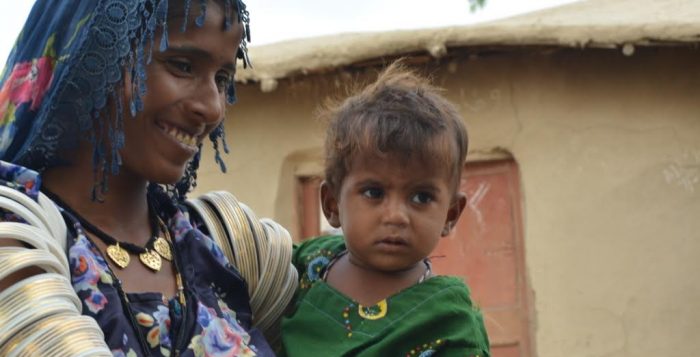
Community World Service Asia is operating three Rural Healthcare Units (RHU) in Hyderfarm Taluka, Nabisar Taluka Kunri and Dhoronaro in district Umerkot in Sindh. These healthcare units provide curative and preventive health services to the communities. The RHUs located in Hyderfarm and Nabisar also consist of an outdoor patient department (OPD) and provides free consultations and essential medicines to patients. Labour rooms are operational at all the three health facilities. The staff at these healthcare units include female medical officers, lady health visitors (LHVs), medical technicians and social mobilizers.
The health services at these RHUs focus primarily on reproductive health of women of child-bearing age. Disease Early Warning System (DEWS) and Health Information System (HIS) have also been established at two of these health facilities.




